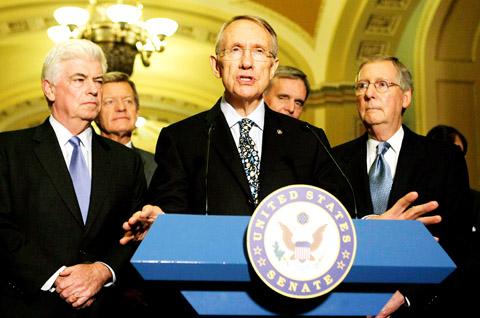The US Senate’s approval of a revised US$700 billion bailout bill helped boost European stocks and lift the dollar yesterday, but economic worries weighed on Asia and concern over final passage of the proposal lingered.
The fate of the rescue plan, passed by the Senate 74 to 25 on Wednesday night, now lies with the House of Representatives, which rocked global markets this week by rejecting an earlier version.
“With the improvements the Senate has made, I believe members of both parties in the House can support this legislation,” US President George W. Bush said in a written statement.

PHOTO: AFP
The House is expected to vote on the package later today.
But the crisis has spread well beyond US shores and beyond the financial sector. Top automakers including General Motors Corp and Ford warned of tough times amid fears slowing demand could force production cuts and job losses.
“The problems of subprime and credit crunch are now all over the world,” Ford Motor Co chief executive Alan Mulally said. “The downturn is longer and deeper than we foresaw a year ago.”
European Commission President Jose Manuel Barroso welcomed the Senate’s approval as heading in the right direction.
“We need global effort to inject confidence in the financial markets and the United States, of course, have a major responsibility,” he said.
Meanwhile, French President Nicolas Sarkozy’s office said the president would host the leaders of Britain, Italy, Germany and the European Central Bank tomorrow to discuss a response.
Sarkozy, however, denied reports a 300 billion euro (US$414.4 billion) plan akin to the US bailout was under consideration.
Market participants warned, however, that the rescue package is not a cure-all, with a worsening economic outlook spurring calls for central banks to cut interest rates.
“Even if the bill is passed, worries remain over the global economic outlook so financial markets are unlikely to stabilize,” said Masamichi Adachi, senior economist at JPMorgan in Tokyo. “It’s a completely different world now. All the things US authorities are doing now are simply aimed at preventing a global meltdown.”
Under the deal, the Treasury would take on illiquid assets held by banks, in the hope of restoring confidence and unfreezing credit markets.
The bailout package was never in danger in the Senate. Senators instead played catalysts for the House, adding billions of dollars in tax provisions popular with the left and right in a bid that House leaders hope — but cannot guarantee — will persuade enough of the House rank-and-file to switch from “nay” to “aye” on a highly contentious bill a month before Election Day.
They were especially targeting the 133 House Republicans who voted against the package.
Also See: Democratic skepticism trumps Republican economic dogma、SEC extends US short-selling ban、TAIEX drops in spite of bailout clearing Senate

MORE VISITORS: The Tourism Administration said that it is seeing positive prospects in its efforts to expand the tourism market in North America and Europe Taiwan has been ranked as the cheapest place in the world to travel to this year, based on a list recommended by NerdWallet. The San Francisco-based personal finance company said that Taiwan topped the list of 16 nations it chose for budget travelers because US tourists do not need visas and travelers can easily have a good meal for less than US$10. A bus ride in Taipei costs just under US$0.50, while subway rides start at US$0.60, the firm said, adding that public transportation in Taiwan is easy to navigate. The firm also called Taiwan a “food lover’s paradise,” citing inexpensive breakfast stalls

TRADE: A mandatory declaration of origin for manufactured goods bound for the US is to take effect on May 7 to block China from exploiting Taiwan’s trade channels All products manufactured in Taiwan and exported to the US must include a signed declaration of origin starting on May 7, the Bureau of Foreign Trade announced yesterday. US President Donald Trump on April 2 imposed a 32 percent tariff on imports from Taiwan, but one week later announced a 90-day pause on its implementation. However, a universal 10 percent tariff was immediately applied to most imports from around the world. On April 12, the Trump administration further exempted computers, smartphones and semiconductors from the new tariffs. In response, President William Lai’s (賴清德) administration has introduced a series of countermeasures to support affected

CROSS-STRAIT: The vast majority of Taiwanese support maintaining the ‘status quo,’ while concern is rising about Beijing’s influence operations More than eight out of 10 Taiwanese reject Beijing’s “one country, two systems” framework for cross-strait relations, according to a survey released by the Mainland Affairs Council (MAC) on Thursday. The MAC’s latest quarterly survey found that 84.4 percent of respondents opposed Beijing’s “one country, two systems” formula for handling cross-strait relations — a figure consistent with past polling. Over the past three years, opposition to the framework has remained high, ranging from a low of 83.6 percent in April 2023 to a peak of 89.6 percent in April last year. In the most recent poll, 82.5 percent also rejected China’s

PLUGGING HOLES: The amendments would bring the legislation in line with systems found in other countries such as Japan and the US, Legislator Chen Kuan-ting said Democratic Progressive Party (DPP) Legislator Chen Kuan-ting (陳冠廷) has proposed amending national security legislation amid a spate of espionage cases. Potential gaps in security vetting procedures for personnel with access to sensitive information prompted him to propose the amendments, which would introduce changes to Article 14 of the Classified National Security Information Protection Act (國家機密保護法), Chen said yesterday. The proposal, which aims to enhance interagency vetting procedures and reduce the risk of classified information leaks, would establish a comprehensive security clearance system in Taiwan, he said. The amendment would require character and loyalty checks for civil servants and intelligence personnel prior to